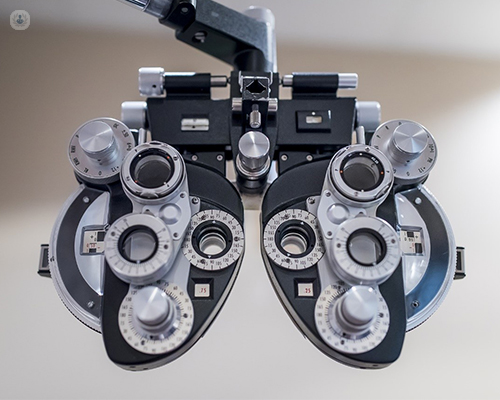Your cataracts journey: consultations, surgery and aftercare
Written by:Nowadays, cataracts are very easily treated and the journey from your first consultation to surgery is one taken by many. During cataract surgery, the old, cloudy lens is removed and replaced with a new lens. The entire procedure can be over in as little as 20 to 25 minutes and the results are permanent. Mr Bal Manoj, a senior consultant ophthalmologist and cataract surgeon, explains the care you’ll receive from your consultation leading up to surgery and aftercare.

Your first consultation: discovering that you need cataract surgery
Perhaps your first consultation is a routine eye check-up or maybe you’ve noticed a change in your quality of vision. In any case, your general eye health will be fully evaluated with an examination by a trained eye specialist. Both eyes will be meticulously looked at to identify any potential problem, and in the case of cataracts, your eye specialist will be able to observe that your lens is clouded over by a cataract.
In order to treat cataracts, they must be removed and replaced with an artificial lens. If your eyes are being evaluated by an ophthalmologist rather than other types of eye specialists, they themselves may be the ones who perform the cataract surgery for you.
When a cataract is identified: deciding the best time for surgery
If the cataract is not severe, you may decide to wait before having cataract surgery. However, cataracts will almost always continue to negatively affect the eye’s vision capability and you will likely need it eventually. Furthermore, while cataracts will not harm you, they can result in accidents or falls due to poor vision and impair your ability to read and drive. In these cases, some patients decide to go for treatment sooner rather than later.
What topics should I make sure my eye specialist discusses with me? Understandably, people can feel vulnerable when they need to undergo any type of procedure, and so it’s important to discuss everything with your surgeon that can relieve worries and doubts.
- There are different types of replacement lenses. Your specialist will help you choose the best one for you based on your wants and needs.
- You should discuss the expected results regarding your vision. Depending on your desired replacement lens, you may or may not need glasses after surgery.
- You’ll discuss the procedure and recovery.
- No operation is completely risk-free, but cataracts surgery is very safe. You’ll discuss the small risks and possible complications.
How long does it take from the first consultation to receiving cataracts surgery?
For private patients, the wait for cataracts surgery is much shorter than the wait for patients in the public health service. NHS eye surgeons are required to wait until a patient’s vision is so impaired that they cannot drive but if you are receiving treatment from a private specialist, you’ll find there are no limitations.
Depending on your ophthalmologist, the waiting times can vary. With my cataract services, for example, your cataract surgery can be performed within a week or two of your first consultation. If both eyes have a cataract, you will be treated in one eye first and then the other a few weeks later.
Surgery and aftercare
As cataract surgery is so quick to complete, you’ll be in and out of the clinic in one day. After the operation, you’ll notice an immediate difference in the quality of your vision. You’ll be asked to rest your eyes for a short time in the clinic and then you’ll be checked before you leave.
You’ll receive aftercare in the form of eye drops, and you can call up your clinic and/or specialist about any concerns you may have during the healing process.
If you’re having cataract surgery in both eyes, you’ll return some weeks later for the second procedure. Additionally, you will have a follow-up appointment after each cataract surgery to ensure the eye has healed as expected.
Visit Mr Bal Manoj’s Top Doctors profile to see discover how he can assist you with your eye health and to book a consultation.



